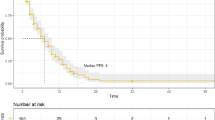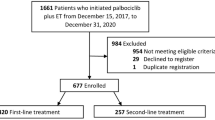Abstract
Background
Fulvestrant is approved for the hormone receptor-positive advanced metastatic breast cancer (MBC) patients during or after prior endocrine treatment. The adding of a targeted agent to fulvestrant has improved the outlook for these patients from recent studies. However, these results were still under investigation, the analysis was undertaken to assess the clinical outcomes of the fulvestrant-based combination therapy compared with fulvestrant monotherapy.
Methods
I systematically searched electronic databases to identify eligible literatures till January 2019. Randomized-controlled trials (RCTs) assessing the efficacy of a targeted agent to fulvestrant with fulvestrant mono-therapy in MBC patients who are refractory to or intolerant of prior endocrine therapy were included.
Results
Six RCTs were included in this analysis. The group of a targeted agent to fulvestrant was significantly improved overall survival (OR = 0.86, 95%CI = 0.76–0.97, P = 0.02), progression-free survival (OR = 0.66, 95%CI = 0.54–0.81, P < 0.0001), as well with the objective response rate (OR = 2.30, 95%CI = 1.67–3.18, P < 0.00001), respectively. However, there are more adverse effects with the combination group (OR = 6.71, 95%CI = 5.58–8.06, P < 0.00001).
Conclusions
Pooled results indicate that adding a targeted agent to fulvestrant prolonged OS, PFS and ORR in relapse or metastatic hormone receptor-positive breast cancer after prior endocrine therapy. Combination of fulvestrant with a targeted agent was associated with more frequent grade 3/4 toxicities. Further research is needed to develop a database of reliable biomarkers and their individual impact on the fulvestrant-based combination treatments.





Similar content being viewed by others
References
Stat Fact Sheets SE (2017) Female breast cancer. seer.cancer.gov/statfacts/html/Breast/. Assessed 16 Jan 2018
Başaran Gül A, Twelves C, Diéras Véronique et al (2017) Ongoing Unmet needs in treating estrogen receptor-positive/HER2-negative metastatic breast cancer. Cancer Treatment Rev 63:S0305737217302049
Rugo HS, Rumble RB, Macrae E et al (2016) Endocrine therapy for hormone receptor-positive metastatic breast cancer: American Society of Clinical Oncology Guideline. J Clin Oncol 34:3069–3103 (JCO.2016.67.1487)
Milani A (2014) Overcoming endocrine resistance in metastatic breast cancer: current evidence and future directions. World J Clin Oncol 5(5):990–1001
De PS (2015) Treatment options in HR+/HER2- advanced breast cancer patients pretreated with nonsteroidal aromatase inhibitors: what does current evidence tell us? Future Oncol 11(6):975–981
Deeks ED (2017) Fulvestrant: a review in advanced breast cancer not previously treated with endocrine therapy. Drugs 78:131–137
Osborne CK, Pippen J, Jones SE et al (2002) Double-blind, randomized trial comparing the efficacy and tolerability of fulvestrant versus anastrozole in postmenopausal women with advanced breast cancer progressing on prior endocrine therapy: results of a North American trial. J Clin Oncol 20(16):3386–3395
Howell A, Robertson JF, Abram P et al (2005) Comparison of fulvestrant versus tamoxifen for the treatment of advanced breast cancer in postmenopausal women previously untreated with endocrine therapy: a multinational, double-blind, randomized trial. J Clin Oncol 16(2):184–184
Cope S, Ouwens MJ, Jansen JP et al (2013) Progression-free survival with fulvestrant 500 mg and alternative endocrine therapies as second-line treatment for advanced breast cancer: a network meta-analysis with parametric survival models. Value Health 16(2):403–417
Cristofanilli M, Turner NC, Bondarenko I et al (2016) Fulvestrant plus palbociclib versus fulvestrant plus placebo for treatment of hormone-receptor-positive, HER2-negative metastatic breast cancer that progressed on previous endocrine therapy (PALOMA-3): final analysis of the multicentre, double-blind, phase 3 randomised controlled trial. Lancet Oncol 17(4):425–439
Baselga J, Im SA, Iwata H et al (2017) Buparlisib plus fulvestrant versus placebo plus fulvestrant in postmenopausal, hormone receptor-positive, HER2-negative, advanced breast cancer (BELLE-2): a randomised, double-blind, placebo-controlled, phase 3 trial. Lancet Oncol 18:904–916 (S1470204517303765)
Sledge GW, Toi M, Neven P et al (2017) MONARCH 2: abemaciclib in combination with fulvestrant in women with HR +/HER2-advanced breast cancer who had progressed while receiving endocrine therapy. J Clin Oncol 35(25):2875
Zaman K et al (2015) Fulvestrant with or without selumetinib, a MEK 1/2 inhibitor, in breast cancer progressing after aromatase inhibitor therapy: a multicentre randomised placebo-controlled double-blind phase II trial, SAKK 21/08. Eur J Cancer 51(10):1212–1220
Burstein HJ, Cirrincione CT, Barry WT et al (2014) Endocrine therapy with or without inhibition of epidermal growth factor receptor and human epidermal growth factor receptor 2: a randomized, double-blind, placebo-controlled phase III trial of fulvestrant with or without lapatinib for postmenopausal women. J Clin Oncol 32(35):3959
Higgins JPT, Altman DG, Gøtzsche PC et al (2011) The Cochrane Collaboration’s tool for assessing risk of bias in randomised trials. Br Med J 343(7829):889–893
Higgins JPT, Thompson SG (2002) Quantifying heterogeneity in a meta-analysis. Stat Med 21:1539–1558
Leo AD, Johnston S, Lee KS et al (2017) Buparlisib plus fulvestrant in postmenopausal women with hormone-receptor-positive, HER2-negative, advanced breast cancer progressing on or after mTOR inhibition (BELLE-3): a randomised, double-blind, placebo-controlled, phase 3 trial. Lancet Oncol 19(1):87
Turner NC, Slamon DJ, Ro J et al (2018) Overall survival with palbociclib and fulvestrant in advanced breast cancer. N Engl J Med 379:1926–1936
Campone M, Im SA, Iwata H et al (2018) Buparlisib plus fulvestrant versus placebo plus fulvestrant for postmenopausal, hormone receptor-positive, human epidermal growth factor receptor 2-negative, advanced breast cancer: overall survival results from BELLE-2. Eur J Cancer 103:147–154
Slamon DJ, Neven P, Chia S et al (2018) Phase III randomized study of ribociclib and fulvestrant in hormone receptor-positive, human epidermal growth factor receptor 2-negative advanced breast cancer: MONALEESA-3. J Clin Oncol 36(24):2465–2472 (JCO2018789909)
Howell A, Pippen J, Elledge RM et al (2010) Fulvestrant versus anastrozole for the treatment of advanced breast carcinoma. Cancer 98(2):229–238
Cheung KL, Robertson JFR (2002) Treatment options for postmenopausal women with tamoxifen-resistant advanced breast cancer. Am J Cancer 1(4):293–300
Gradishar WJ, Anderson BO, Balassanian R et al (2018) Breast Cancer, Version 42017, NCCN Clinical Practice Guidelines in Oncology. J Natl Compr Cancer Netw 16(3):310
Toy W, Shen Y, Won H et al (2013) ESR1 ligand-binding domain mutations in hormone-resistant breast cancer. Nat Genet 45(12):1439–1445
Pritchard KI (2013) Endocrine therapy: is the first generation of targeted drugs the last? J Intern Med 274(2):144–152
Hortobagyi GN, Stemmer SM, Burris HA et al (2016) Ribociclib as first-line therapy for HR-positive, advanced breast cancer. N Engl J Med 375(18):1738–1748
Hortobagyi GN, Chen D, Piccart M et al (2015) Correlative analysis of genetic alterations and everolimus benefit in hormone receptor-positive, human epidermal growth factor receptor 2-negative advanced breast cancer: results from BOLERO-2. J Clin Oncol 34:419 (JCO.2014.60.1971)
Vora SR, Juric D, Kim N et al (2014) CDK 4/6 inhibitors sensitize PIK3CA mutant breast cancer to PI3K inhibitors. Cancer Cell 26(1):136–149
Kechagioglou P, Papi RM, Provatopoulou X et al (2014) Tumor suppressor PTEN in breast cancer: heterozygosity, mutations and protein expression. Anticancer Res 34(3):1387–1400
Altomare DA, Testa JR (2005) Perturbations of the AKT signaling pathway in human cancer. Oncogene 24(5):7455–7464
Slamon DJ, Leyland-Jones B, Shak S et al (2001) Use of chemotherapy plus a mono-clonal antibody against HER2 for metastatic breast cancer that overexpresses HER2. N Engl J Med 344:783–792
Rodon J, Braňa I, Siu LL et al (2014) Phase I dose-escalation and -expansion study of buparlisib (BKM120), an oral pan-class I PI3K inhibitor, in patients with advanced solid tumors. Invest New Drugs 32:670–681
Author information
Authors and Affiliations
Contributions
Y-MH: protocol/project development, data collection and management, manuscript writing/editing.
Corresponding author
Ethics declarations
Conflict of interest
The authors declare there is no conflict of interest.
Additional information
Publisher's Note
Springer Nature remains neutral with regard to jurisdictional claims in published maps and institutional affiliations.
Rights and permissions
About this article
Cite this article
Hua, YM. An evidence-based review of the outcome of fulvestrant plus a targeted agent versus fulvestrant alone in treating hormone receptor-positive endocrine therapy-resistant metastatic breast cancer. Arch Gynecol Obstet 300, 1377–1382 (2019). https://doi.org/10.1007/s00404-019-05304-8
Received:
Accepted:
Published:
Issue Date:
DOI: https://doi.org/10.1007/s00404-019-05304-8




